UPDATE 7/8/21 — BREAKING NEWS:
EAA issued a report today saying FAA took some steps to resolve this matter, but it is far from an elegant solution and does not fully address the problem. You can get a lot from Pelton’s concluding remark but I urge reading the whole article. ••• This thing is far from over, I suspect.
Here’s what Jack wrote, “This entire episode is a scary example of how new interpretations of the regulations can upend the entire community. While this short-term fix allows operations to continue, it never should have come to this point. Creating more than 30,000 new LODAs and exemptions is a paperwork exercise that does nothing to advance safety.”
A most worrisome thing happened recently and it definitely fired up journalists in cyberspace.
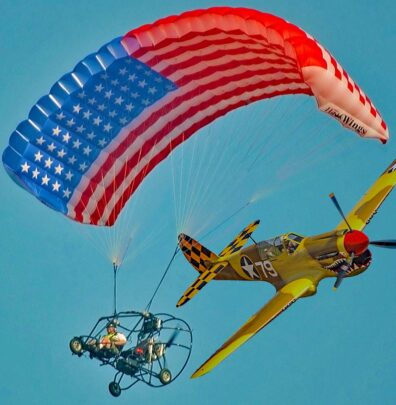
Conflict in the skies? A court’s ruling could have an enormous impact on warbirds and Light-Sport Aircraft such as powered parachutes.
FAA’s Orlando Flight Standards District Office took an organization called Warbirds Adventures to court over them charging students they were instructing in a Curtiss P-40 Warhawk.
“That doesn’t affect me,” you might say. Don’t be too sure.
FAA’s regulatory enforcement action “has left CFIs confused and at risk from the greater future liability of ‘flying for hire,’ along with potential regulatory and medical consequences,” reported SAFE, a flight instructor group. “Needless to say, this case has cause a firestorm in the aviation media.”
Flying magazine reported, “[According to a] 1995 Fretwell FAA Legal Interpretation, the trainee is compensating the instructor not for piloting the aircraft, but for the instruction they are providing.”
However, Flying continued, “FAA is now essentially arguing that, for regulatory purposes, ‘paying-passenger’ carriage is exactly what flight instructors are doing every time they take a student into the air for a lesson.”
The magazine concluded (correctly, in my opinion), “If paid flight instruction is now considered ‘carriage of persons for compensation or hire,’ an entire sector of flight instructor licensure — the sport pilot flight instructor — has now been rendered null and void.” … “The recent decision in [the legal case of] Warbird Adventures has the potential to drastically change the foundation of aviation knowledge and safety — flight instruction — as we know it.”
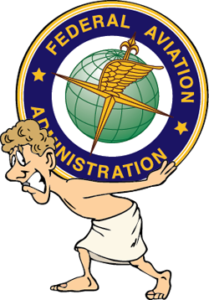
EAA also senses danger, writing, “[An] overly broadly worded ruling by the court could interfere with the right of Limited Category and Experimental Category owners to receive training in their own aircraft. While hiring such aircraft for training has usually been conducted via exemption or LODA, owners and operators have always been able to pay instructors to fly in their own aircraft.”
That may now change, and here’s something none of the other articles touched upon: insurance. When the insurance industry gets wind of this (as they already have according to one account), they may refuse to provide insurance for compensated training by a CFI-S in a LSA. Beyond FAA’s action, a lack of insurance could close down many flight instruction operations.
My FAA advocacy partner Roy Beisswenger (Powered Sport Flying magazine publisher and EasyFlight YouTube channel personality) wrote a spot-on editorial on the subject. I urge you to read his words carefully. —DJ
Training Really Is for Hire
An interesting thing happened on the way to federal court.
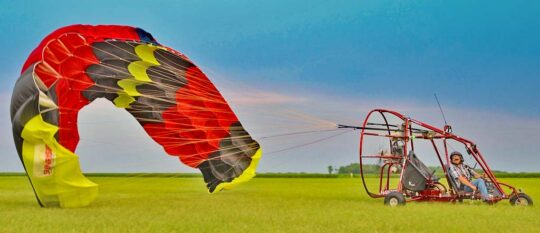
Instructors are blown away by the potential disruptions the court ruling may trigger.
The FAA wanted to make sure that a warbird training operation went through some special hoops in order to train in warbirds. The training operation refused. The FAA took the company to court arguing that under 14 C.F.R § 91.315, “[n]o person may operate a limited category civil aircraft carrying persons or property for compensation or hire.” And since the aircraft in question is a limited category aircraft, it could not be operated for training.
The Court of Appeals agreed and stated that, “the aircraft is not certified for paid flight instruction and substantial evidence supports the order.”
And then they said “Instead, Warbird argues that § 91.315 does not prohibit paid flight training. We disagree. A flight student is a “person.” Id. § 91.315; see also id. § 1.1. When a student is learning to fly in an airplane, the student is “carr[ied].” Id. § 91.315. And when the student is paying for the instruction, the student is being carried “for compensation.” Id.
Hmmm… Gotta hate it when judges use logic and stuff.
But, here’s the problem.
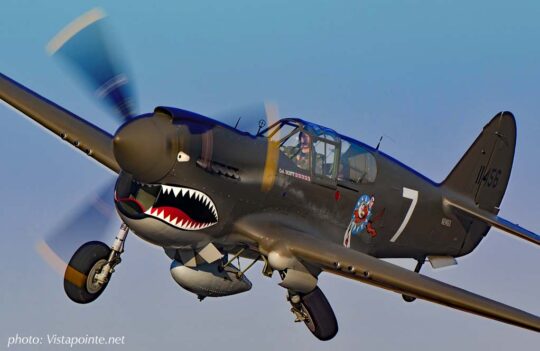
On the pilot side, the FAA has said that flight instruction isn’t a compensation or for hire activity. The reason for this is that they know in order for a pilot to receive compensation, they have to have a Commercial Pilot Certificate and a current 2nd Class Medical. The way the regulations work, all GA flight instructors need a Commercial Pilot Certificate in order to qualify initially for a Flight Instructor Certificate, but many didn’t want or weren’t able to maintain a 2nd Class Medical to just instruct.
Yet on the aircraft side, the FAA says that certain aircraft can’t be flown for flight instruction for compensation or hire… well at least not without special permission from the FAA in the form of a Letter of Deviation Authority or LODA.
This ruling creates all kinds of problems for flight instructors wanting to provide training to students who own their own experimental, limited category, and primary category aircraft. The big aircraft organizations are pointing this out to the FAA and are beginning the fight to correct this.
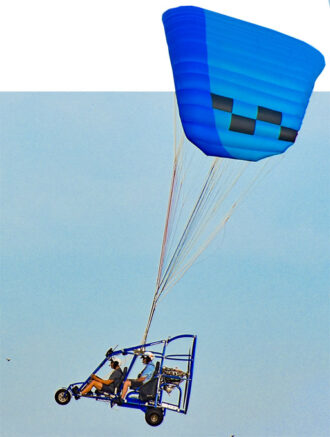
And the FAA is very strict about whether Sport Pilots can fly for “compensation or hire.” They can’t. The FAA makes that abundantly clear in the regulations. How’s this for making things painfully obvious?
§61.315 What are the privileges and limits of my Sport Pilot certificate?
(c) You may not act as pilot in command of a Light-Sport Aircraft:
(1) That is carrying a passenger or property for compensation or hire.
(2) For compensation or hire.
(3) In furtherance of a business.
Did the FAA expect to win a ruling that said that flight instruction is “carrying a passenger for compensation or hire” and thereby shut down the entire Sport Pilot flight instruction industry? I don’t think so, but it sure looks like that is exactly what might have happened.
It seems to get worse, too. Does this ruling mean that the best of the GA flight instructors, those seasoned instructors who don’t have 2nd Class Medicals anymore are out of business, too?
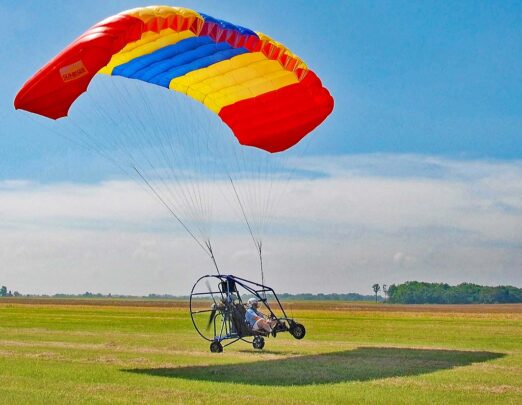
Now there is a solution. At least for the FAA’s Sport Pilot problem. LAMA and USUA have written the FAA and proposed additional language to both the GA flight instructor regulations and the Sport Pilot flight instructor regulations. It’s really pretty simple. We just want the FAA to include language saying that flight instructors have the privilege of providing flight instruction “for compensation or hire.”
Pretty simple, huh?
Maybe it’s too simple.
Of course, there was a little more to the letter, but not that much more.
In the meantime, should Sport Pilot flight instructors stop instructing? I don’t see any evidence that the FAA is going to shut down flight instruction immediately. I look at this as a legal stitch that needs correcting and that the FAA will be motivated to correct. So for now, I personally intend to continue to flight instruct for compensation or hire. At least until the FAA says I can’t anymore.
Enjoy the summer and get your flight instruction while you can!
Do you prefer video over reading? No sweat. Roy has you covered again. Check this fresh video from his YouTube channel:


If I want to get trained in my experimental, does it require 2 LODAs? One to authorize me to receive training in my plane, and another to authorize my instructor to provide training in experimentals?
One would’ve sufficed but with FAA getting aggressive, the answer is less certain than it was.
The July 12 clarification from the FAA is rather damning.
The FAA issued a new directive effective July 12 that “provides notification on flight training for compensation in certain aircraft,” specifying it applies to receiving and providing instruction in limited, primary, and experimental category aircraft. Meanwhile, in court proceedings, the FAA is prosecuting flight instructors who volunteered their time instructing in limited category aircraft and didn’t receive a penny for doing so, arguing the volunteers had received compensation.
The FAA argued in court that flight instructors who volunteered their time training pilots in limited category aircraft were given “compensation” whether money changed hands or not. The recent FAA directive requiring approval to provide compensated instruction also applies to experimental and primary category aircraft. Photo by Chris Rose.
Dan, I am assisting the sale of an aircraft for an individual whose insurance company has nixed him from getting flight instruction in his Experimental. Thanks for the background. I had earlier surmised that the government really wanted to hire more people to process LODAs …or worse, kill the industry because it is counter to the “Go Green” crowd. Now I realize that it is not quite so nefarious …just stupid. What percent of the FAA staff are pilots? An interesting statistic to understand.
I have to wonder why the FAA didn’t put some bounds on the “experimental” part of it. With a bit of study, it seems like it would have been possible to use weight, horsepower, or speed qualifiers to box in the aircraft (warbirds) they wanted to affect and not take the whole experimental category with it. Got to hope that eventually something will be done to put flight instruction back where it was or that specific regulations allowing compensation for flight instruction only will need to be put in place to avoid strangling the community, no matter whether Light Sport or GA.
Perhaps this point was not clear, but FAA only took a group to task for not following the LODA process. It was the court that used FAA’s own language to say this business of training a student is “carrying a passenger” for hire. That’s what really made a Florida legal decision go national instead of being limited to a single enforcement action. It seems clear FAA’s field office did not consider the ramifications of the action they took.
LAMA and its advocacy partner USUA already suggested language that if FAA could incorporate into the coming regulation that would totally solve this. Whether they take our simple suggestion (which they acknowledged) remains to be seen.
The Court CAN NOT MAKE LAW. They can only INTERPRET what is written. So the FAA can just say that if that is how it is interpreted just rewrite the regulation. It is not rocket science. Although the FAA can certainly make rocket science. The FAA can also write a notice of intent to explain what they are trying to accomplish. This is then their own interpretation of their regulation.
FAA is rewriting the regulation and LAMA with USUA have proposed exact language they can use. (It’s a surprisingly simple fix but must be part of the new regulation.)
The court merely forced FAA to follow its own regulation; it did not write new law. The results are awful for much of aviation but this is not because the court misbehaved.
Dan, I think the judge did not know much about aviation and the complainants knew that. My idea is the flight instructors might form a club so the person who wants to fly will have dues to be a member. While he or she is a member of that club the instructor can offer free flight instructions. He will be the operator owner of the club and control the dues for maintenance. Work or not, I don’t know…
Ron
Now here is question many may not be thinking of. Because this affects more than just pilots and training. Since the FAA is saying the training is for hire, wouldn’t that make all flight schools and training fall under chapter 121 & 135? Majority of these only do 91 maintenance. Part 91 maintenance operations is now where near the same level of involvement as the others. Wouldn’t that mean the maintenance done and the aircraft unairworthy also?
Scary sounding situation for sure, but I wonder why Warbird Adventures refused to pursue the LODA? Is it an arduous task? I imagine that it is, being that you are dealing with a bureaucracy, and they apparently crossed them by not conforming to their regulations.
To me this sounds a little out of character for the FAA, who in my experience (very limited to those in the field) are in general very helpful, knowledgeable people with all our safety in mind.
So to me it seems that perhaps the Warbird Adventures team may have gone to far with the refusal to accommodate the FAA. Please don’t get me wrong; heritage aircraft firms put an unbelievable amount of time and money into the aircraft they exhibit and fly. Add to that they don’t charge enough for what they provide to all of us, in my personal opinion. I hold these heritage aircraft as symbols of Americans pursuit of excellence in engineering required to overcome threats to our liberty provided by our democratic process.
It is my sincerest hope that this can be resolved without a unnecessary court battle. Perhaps you folks can help by shedding some light on circumstances by presenting the FAA’s side of the argument and might even go as far as to suggest a remedy
Depending on where your aircraft is based and which FSDO you must approach for a LODA, yes, it can be quite challenging I’ve been told numerous times. In other locations, I understand it’s gone much more smoothly, especially when the applicant has developed a relationship with FSDO. This is common in FAA which gives its field offices a degree of autonomy to handle local matters. It appears that’s what happened in this situation and the local FSDO may not have considered the larger ramifications of their action (though I am speculating with such an assessment).
I would never try to present FAA’s side of the argument; I’ll leave that to their communications people.
The initial court battle is over; that’s what triggered the firestorm. What happens next is an open question.
I would say nothing happens next. Why? Because longstanding law and practice in this case is covered by the commerce clause of the U.S. Constitution and messing with the commerce clause of the U.S. Constitution is verboten, following all of the related case law. With over 200 years of case law; the commerce clause says no one; I repeat no one, can interfere with commerce; which includes courts and any government agency or agencies; though they do try on a temporary basis and do get away with temporary changes only. So while this appears to be a serious problem, any conversation with a commerce clause attorney will tell you not, although with attorneys arguments are the norm but in this case highly unlikely.
As you mentioned, this puts a CFI-S in an immediate quandry. It’s bigger than that, though, since any subpart H CFI flying on as Class III medical can’t instruct anymore (something you also mentioned). The other big impact is the ruling that neither a CFI-S or a CFI can instruct in an experimental without a LODA, which fits a significant number of folks who have approached me recently. Frankly, it’s another stroke against the CFI-S rating which, at least in the LSA part of things, is already severely handicapped by a lack of trainers and rentals. (I’ve only been flying with folks who bring me their own airplanes for the last couple of years; good thing I only instruct part time because I want to).
They need to take lessons from DOT.
More ridiculous government overreach.
The states need to get involved and take care of their own LSAs and LPAs.
Private pilots that don’t fly intercontinental flights should be governed by the state of origin…
Oh, Marc, that’s all we’d need – local politicians regulating small airplanes…
Mr. Gills, Yes, the Florida judge did not have anyone pointing him at the US constitution commerce clause and request he read it. The judge’s response is very contrary to the commerce clause and all of the 200 plus years of case law. It would probably take a lifetime or an army of Attorneys to read all of the commerce clause case law or both. I know both FAA legal counsel and the US Justice Department must know the US commerce clause as well or better than any attorneys. Why the Florida people did not bring in either is the big mystery to get the judge to read the commerce clause as to what can and can not be done. The hair splitting in this case is non sensical if they had started from the beginning with the commerce clause; at least in summary would have opened the judges eyes. How so many people could ignore the obvious just floors me!!!! One can never rely on case law by itself; all Attorneys I know will tell you this; even for local cases. Just incredibly off the wall and very unlawful from a judge steered on the wrong direction. Although; the judge should know where to go as a baseline; which makes this situation all the more bizarre. I assume the FAA will need to go ask this judge to start with the commerce clause in order to avoid this ridiculous but obvious to him conclusion. The error may be at the FAA since crossing state lines with such a ridiculous ruling would for certain make it unlawful and not useable.